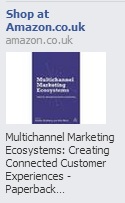Making ad retargeting less annoying
766 words | ~4 min
Yesterday I wrote this post about a book in which I have a chapter, which meant going to this page to get the link. I obviously didn't buy the book because I already have a copy, not that I expect the internet to know this. And behold, today in Facebook's sidebar I see this ad:

Which is sort of fair enough, and sort of not. It got me wondering, how do we reconcile these two truths?
- Ad retargeting is effective.
- Ad retargeting is annoying.
As I said, I can't expect the internet to know that I own a book whose page I visited just for the purpose of getting the link. So by the logic that says This person looked up a book, then didn't buy it, it's reasonable to infer They may act when given a second opportunity to look at the same book.
But on the other hand, the same inference is not reasonable. There are many, many reasons why someone may have visited the page for that book and not bought it (disinclination, lack of time, vanity, blue book cover fetishism, etc.). Some of these are more likely than others, but in all cases the outcome is the same: a person had the chance to buy the book, and didn't.
Straight retargeting is the online manifestation of a mindset that says: I heard your first answer, and it was 'no', and I'm going to keep nagging you. That is the equivalent, in offline sales, of you popping into your local bookstore, looking at a book, putting it back on the shelf, leaving... then being phoned several times by the bookseller saying, 'Did you want that book?'
And beyond the world of sales, there's a word for people who don't realise that 'no' means 'no'.
Look, retargeting works well relative to other forms of online display media. But it works best when there's been a genuine signal of intent to purchase, such as adding a product to a basket. The evidence base is patchy, but according to this 2011 study, 71% of online shoppers abandon baskets - but 75% of those come back, typically spending 55% more than direct converters, and the uplift from retargeting 'basket abandoners' within 12 hours is around 15-20%. So a nudge in that critical period reflects a normal behaviour and can be useful. But even in this case, the conversion rate from retargeted display ads to basket abandoners is still only 0.3%.
Now imagine how dismal the uplift will be on retargeting people who have just visited a product page. Yes, it's better - but it's better than something really bad. The reason it's better is because you're applying a segmentation over your ad inventory - albeit a fairly dumb one. People who have looked at a book are certain to be more likely than average to be interested in that book.
A recent (Dec 2013) survey on retargeted ads found that 38% of people found them offputting, in addition to the 46% who ignored them and the 16% who claimed to have been prompted by them. Even if we take this optimistic 16% figure (rather than the 0.3% conversion rate from the SeeWhy study), that means that retargeted ads annoy more than twice as many people as they win over. Not surprising, as 53% in the same survey said they had privacy concerns over retargeted ads.
So why not take the 'stalker' factor out of retargeting? Product-view data gives you a very simple segmentation, if you can be bothered to connect the product back to its category. In this case, all you need to know is that the book I looked at is a book about marketing. Then you can target me with other marketing books. I'll feel a bit less creeped out, and you'll still outperform non-targeted advertising because you won't be serving me books on stuff I don't care about, or marketing books to people with no interest in marketing. You'll also be able to switch tactics - if one book doesn't grab my attention, another one might.
I'd love to see some data on whether this is any more or less effective than same-product retargeting when served to people who have given no intent signal. But it's got to be less annoying.
# Alex Steer (02/01/2014)